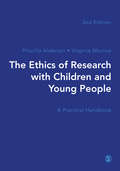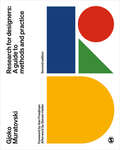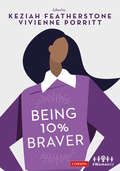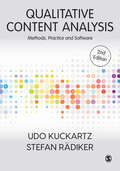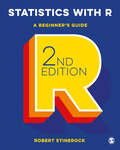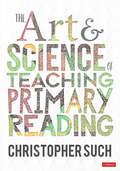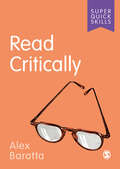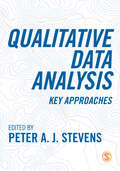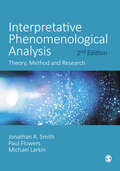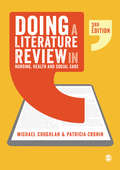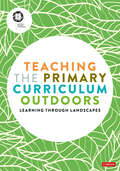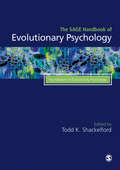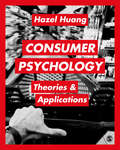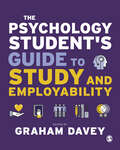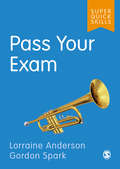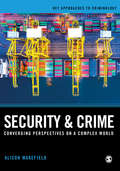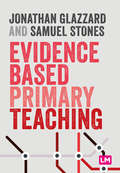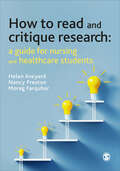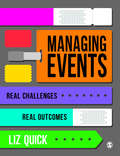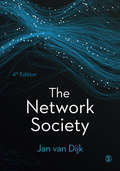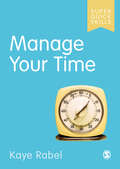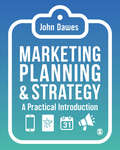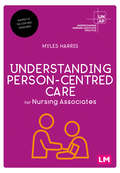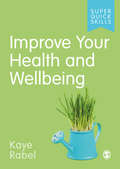- Table View
- List View
The Ethics of Research with Children and Young People: A Practical Handbook
by Priscilla Alderson Virginia MorrowA practical guide to carrying out ethical research with children and young people, this practical handbook examines the ethical questions that arise at each stage of research, from first plans to dissemination and impact. Illustrated with case studies from international and inter-disciplinary research, it offers advice for addressing each ethical question, issue or uncertainty. Including: • A showcase of the best practice on a range of topics including data protection • Practical guidance for responding to recent global changes in policy and practice in ethics and law • Discussion of the challenges and opportunities of digital research with children The updated second edition continues to provide an excellent resource for those exploring the old, current and new consensuses on the ethics of researching with children.
Research for Designers: A Guide to Methods and Practice
by Gjoko MuratovskiDesign is everywhere. It influences how we live, what we wear, how we communicate, what we buy, and how we behave. To design for the real world and define strategies rather than just implement them, you need to learn how to understand and solve complex, intricate and often unexpected problems. Research for Designers is the guide to this new, evidence-based creative process for anyone doing research in Design Studies or looking to develop their design research skills. The book: Takes an organized approach to walking you through the basics of research. Highlights the importance of data. Encourages you to think in a cross-disciplinary way. Including interviews with 10 design experts from across the globe, this guide helps you put theory into practice and conduct successful design research.
Being 10% Braver (Corwin Ltd)
by Vivienne Porritt Keziah FeatherstoneThrough the real-life stories of women leaders in education, drawn from across the #WomenEd community, this book offers guidance and inspiration on how to rise above challenging situations and find personal and professional growth. It′s time to: -Tackle imposter syndrome -Know your worth -Ask for what you need -Call out unacceptable behavior -Put yourself first when necessary -Raise your voice until it′s heard It′s time to own your journey and your story - it′s time to become 10% braver.
Qualitative Content Analysis: Methods, Practice and Software
by Udo Kuckartz Stefan RadikerAre you working with qualitative data but unsure how to approach your analysis? This hands-on guide to qualitative content analysis from two internationally renowned experts provides you with a clear strategy for analysing your data, whether you are working with social media content, field notes, images, narratives or focus group data. Using qualitative interviews as an example, the book provides a clear structure for approaching your analysis that can be adapted for your research project. Explaining how qualitative content analysis differs from quantitative methods, the book provides you with: •a solid understanding of the principles behind QCA •a step-by-step guide to three types of QCA •guidance on how you can use software to enhance your analysis.
Statistics with R: A Beginner′s Guide
by Robert StinerockStatistics is made simple with this award-winning guide to using R and applied statistical methods. With a clear step-by-step approach explained using real world examples, learn the practical skills you need to use statistical methods in your research from an expert with over 30 years of teaching experience. With a wealth of hands-on exercises and online resources created by the author, practice your skills using the data sets and R scripts from the book with detailed screencasts that accompany each script. This book is ideal for anyone looking to: • Complete an introductory course in statistics • Prepare for more advanced statistical courses • Gain the transferable analytical skills needed to interpret research from across the social sciences • Learn the technical skills needed to present data visually • Acquire a basic competence in the use of R and RStudio. This edition also includes a gentle introduction to Bayesian methods integrated throughout. The author has created a wide range of online resources, including: over 90 R scripts, 36 datasets, 37 screen casts, complete solutions for all exercises, and 130 multiple-choice questions to test your knowledge.
The Art and Science of Teaching Primary Reading (Corwin Ltd)
by Christopher SuchThe essential guide to the science behind reading and its practical implications for classroom teaching in primary schools. Teaching children to read is one of the most important tasks in primary education and classroom practice needs to be underpinned by a secure foundation of knowledge. Teachers need to know what reading entails, how children learn to read and how it can be taught effectively. This book is an essential guide for primary teachers that explores the key technical and practical aspects of how children read with strong links to theory and how to translate this into the classroom. Bite-size chapters offer accessible research-informed ideas across all major key topics including phonics, comprehension, teaching children with reading difficulties and strategies for the classroom. Key features include: · Discussions of implications for the classroom · Questions for further professional discussions · Retrieval quizzes · Further reading suggestions · Glossary of key terms Christopher Such is a primary school teacher and the author of the education blog Primary Colour. He can be found on Twitter via @Suchmo83.
Read Critically (Super Quick Skills)
by Alex BarattaCritical reading is the foundation of good research. Read Critically gives you the knowledge and tools you need to be able to extract meaning from texts and judge its quality, relevance and significance. Understand your assignment question Know how to think critically, and in turn read critically Write critically and ace your assignment. Super Quick Skills provides the essential building blocks you need to succeed at university - fast. Packed with practical, positive advice on core academic and life skills, you’ll discover focused tips and strategies to use straight away. Whether it’s writing great essays, understanding referencing or managing your wellbeing, find out how to build good habits and progress your skills throughout your studies. Learn core skills quickly Apply them right away and see results Succeed in your studies and in life Super Quick Skills gives you the foundations you need to confidently navigate the ups and downs of university life.
Qualitative Data Analysis: Key Approaches
by Peter A. StevensWith numerous approaches to choose from, knowing where to start when doing qualitative data analysis (QDA) can be a challenge. This book gives you direction with an accessible and thorough introduction to nine different approaches to QDA, written by a multi-disciplinary team with years of experience teaching and analysing data using these methods. With a clear focus on the ‘how to’ of QDA, each chapter includes: •Step-by-step descriptions of how to apply each approach in your research •Online and in-text activities to help you practice your skills •Annotated reading lists so you can dig deeper into key topics •Case studies from a range of disciplines so you can see how each approach works in practice. The perfect companion on your journey through QDA, the book also offers a comprehensive introduction to the use of NVivo QDA software, helping both new and experienced researchers get to grips with the essentials.
Interpretative Phenomenological Analysis: Theory, Method and Research
by Jonathan A. Smith Paul Flowers Michael LarkinInterpretative phenomenological analysis (IPA) is a qualitative research approach committed to the examination of how people make sense of their major life experiences. This text provides a detailed guide to conducting IPA research, presenting the theoretical underpinnings of the approach, a comprehensive overview of the stages of an IPA research project, and examples of high-quality IPA studies. Extended worked examples from the authors′ own studies in health, psychological distress, and identity illustrate the breadth and depth of IPA research, making this book the definitive guide to IPA for students and researchers alike. New to this edition: - A thoroughly updated chapter dedicated to analysis - An exemplary mini-study - Improved and updated terminology - A chapter discussing innovations in design, data collection, and collaboration ′It is not often I can use "accessible" and "phenomenology" in the same sentence, but reading the new book, Interpretative Phenomenological Analysis…certainly provides me the occasion to do so. I can say this because these authors provide an engaging and clear introduction to a relatively new analytical approach′ - The Weekly Qualitative Report
Doing a Literature Review in Nursing, Health and Social Care
by Michael Coughlan Patricia CroninA clear and practical guide to completing a literature review in nursing and healthcare studies. Providing you with straightforward guidance on how to successfully carry out a literature review as part of your research project or dissertation, this book uses examples and activities to demonstrate how to complete each step correctly, from start to finish, and highlights how to avoid common mistakes. Perfect for any nursing or healthcare student new to literature reviews and for anyone who needs a refresher on this important topic. The third edition includes: Expert advice on selecting and researching a topic A chapter outlining the different types of literature review you may come across Increased focus on Critical Appraisal Tools and how to use them effectively New real-world examples presenting best practice Instructions on writing up and presenting the final piece of work
Teaching the Primary Curriculum Outdoors
by Learning Through LandscapesResearch evidence consistently shows that an outdoor learning environment can improve behaviour, engagement and encourage more active participation in learning. So why keep learning in a classroom? In reality, we know the challenges teachers face. We know the barriers that get in the way of taking learning outside. Learning through Landscapes has three decades of experience supporting teachers with the everyday challenges of teaching outdoors. Through this real life understanding of teaching and step by step guidance, this book shows you that every curriculum subject in primary schools can be taught outdoors. Through the pages of this book, Learning through Landscapes shows you that learning outdoors not only improves the health, wellbeing and attainment of the children in your class - it also brings joy to your teaching.
The SAGE Handbook of Evolutionary Psychology: Foundations of Evolutionary Psychology
by Todd K. ShackelfordEvolutionary psychology is an important and rapidly expanding area in the life, social, and behavioral sciences, and this Handbook represents the most comprehensive and up-to-date reference text in the field today. Chapters in this Handbook address foundational theories and methodological approaches, providing a rich overview of the most important theoretical and empirical work in the field. The SAGE Handbook of Evolutionary Psychology is an essential resource for researchers, graduate students, and advanced undergraduate students in all areas of psychology, and in related disciplines across the life, social, and behavioral sciences. Part 1: Foundations of Evolution Part 2: Middle-Level Evolutionary Theories Part 3: Research Methods and Strategies
Consumer Psychology: Theories & Applications
by Hazel HuangConsumer Psychology: Theories and Applications is the first textbook that systematically discusses a wide range of the psychological theories and their applications in consumer behaviour in an accessible style. The selected psychological theories include both classic theories and contemporary developments, and the applications in consumer behaviour draw from state-of-the-art research underpinned by theories and practical implications. Why are influencers with a smaller number of followers sometimes more effective than the mega influencers? Why are the sounds of brands, such as Coca-Cola and Kit Kat, attractive to consumers? How does music, scent, or lighting influence shoppers? Why can using consumption to boost self-esteem be negative to consumer well-being? Readers will explore these questions and more. This textbook is essential reading for advanced marketing students and also applied psychology students looking at the business world. It includes a chapter on research methods in consumer psychology and can also provide a vital guide for those completing a dissertation project in consumer psychology. Hazel Huang is a Chartered Marketer of the Chartered Institute of Marketing and an Assistant Professor in Marketing at Durham University Business School, UK.
The Psychology Student’s Guide to Study and Employability
by Graham DaveyHow does a Psychology degree work? Where will it lead me? What skills are employers looking for? Psychology is one of the most popular undergraduate degree subjects in the UK, which is no surprise given the wide range of transferrable skills it offers. But how to translate these skills into job opportunities? And which career paths to explore? If you are considering studying psychology, or you are already a psychology student looking at your next steps, this book is for you. Written by leading academics, this handy guide interweaves both study skills and employability skills, providing advice across all three years of your course and talking you through the different options open to you after graduation. From writing essays to revising for exams, and from careers in and outside of professional psychology to further academic study, this book covers everything a psychology student needs to know – even how to make the most of your social life! Graham Davey is Emeritus Professor of Psychology at the University of Sussex.
Pass Your Exam (Super Quick Skills)
by Lorraine Anderson Gordon SparkWant to ace your exam but need help preparing? Pass Your Exam gives you the tools you need to revise effectively and be ready to take your exam with confidence. Find out how to plan your revision and beat procrastination Develop exam techniques for whatever format they take Learn positive strategies for handling the stress of exam season. Super Quick Skills provides the essential building blocks you need to succeed at university - fast. Packed with practical, positive advice on core academic and life skills, you’ll discover focused tips and strategies to use straight away. Whether it’s writing great essays, understanding referencing or managing your wellbeing, find out how to build good habits and progress your skills throughout your studies. Learn core skills quickly Apply them right away and see results Succeed in your studies and in life Super Quick Skills gives you the foundations you need to confidently navigate the ups and downs of university life.
Security and Crime: Converging Perspectives on a Complex World (Key Approaches to Criminology)
by Alison WakefieldSecurity and Crime is an authoritative and multidisciplinary analysis of the relationship between security and crime, addressing much of the confusion about its nature and meaning, clarifying its relevance to criminological analysis, and giving due attention to the interdisciplinary nature of the topic. Providing an historical and prospective look at issues within security the book will: trace the development of ′security′ across disciplines situate this contested concept within criminological discourse and concerns explore the rising attention in politics and academic scholarship to ′security′ issues as they relate to crime examine the nature and organisation of interventions to deliver security establish clearly the relationship between security, crime and criminology. International in scope, and broad in coverage, Security and Crime sets out the need to broaden the study of security in a clear, concise style that is easy for students to digest. With comprehensive pedagogical feature including chapter overviews, key terms, study questions, further reading and a glossary, this book is essential for students studying security in criminology, criminal justice, international relations, and related disciplines.
Can We Trust the Gospels?
by Peter J. WilliamsThe Gospels—Matthew, Mark, Luke, and John—tell the story of the life and teachings of Jesus Christ while he was on earth. But how do Christians know if they are true? What evidence is there that the events actually happened? This accessible introduction to the historical and theological reliability of the four Gospels, written by New Testament scholar Peter J. Williams, presents evidence from a variety of non-Christian sources, assesses how accurately the 4 accounts reflect the cultural context of their time, compares different accounts of crucial events, and considers how these texts were handed down throughout the centuries. Written for the skeptic, the scholar, and everyone in between, this book answers common objections raised against the historicity of the Gospels in order to foster trust in God's Word.
Evidence Based Primary Teaching (Primary Teaching Now)
by Jonathan Glazzard Samuel StonesNew and trainee teacher′s need to know that the strategies they are implementing are underpinned by robust research evidence. This book gives you the key knowledge, supports you to develop critical thinking skills, and helps you understand some of the wider contexts of education and teaching. A comprehensive guide to support, challenge and develop you as a trainee teachers′ in understanding evidence-based teaching in primary schools.
How to Read and Critique Research: A Guide for Nursing and Healthcare Students
by Helen Aveyard Nancy Preston Morag FarquharDo you find research challenging to read? Do you struggle to get to grips with a research paper? Understanding, critiquing and using research is a key requirement of students studying nursing and healthcare. This bookwill equip you with the skills you need to understand research and use it in your practice and academic assignments. The approach used in this book is unique: each chapter focuses on a published research paper – one you might be asked to read for a seminar or include in your academic work. In clear, straightforward language, the authors take you through each paper step by step, using it as a basis for exploring the underpinning research method or design, and how it has been reported. Key features: · Each chapter focuses on a different research method by working through a relevant research paper · Identifies the main skills you need for your course: understanding research methods and critiquing articles · Written specifically for nursing and healthcare students by experienced nursing and health care lecturers · Develops your confidence in understanding research by helping you to apply your knowledge to real research papers.
Managing Events: Real Challenges, Real Outcomes
by Liz QuickCombining the practical and academic aspects of event management this text presents an industry perspective, with real-life event examples and contemporary and relevant case studies. It provides lecturers with a useful platform to integrate key event topics into the learning environment. The book discusses the management process throughout the ‘event cycle’, from the pre-event planning stage; on-site delivery to the post event stage. The book is divided into 4 distinct phases, which are: The Event cycle; Before the event; Throughout the event and Beyond the event. Within each of these 4 sections, there are 2 or 3 separate chapters, each with their own objectives. The book discusses practical and operational elements, such as project management, marketing, sponsorship deals and risk assessment, that need to be put in place both before and during the event. The final section: Beyond the event, examines current and future event trends and issues, and discusses the various career paths that exist and the skills and qualifications required to gain employment and start a successful career in events. Each chapter profiles someone currently working within the events industry, and presents a scenario of a real event challenge they have faced in their work role, relevant to the chapter. Further viewpoints from a second event practitioner and academic are included, before the final outcome is presented, showing us in each case, how real life situations develop and are resolved in practice within the events industry. The feature Event Ethics explores a topical issue that should encourage lively discussion and the Did you know? section reveals an interesting and chapter-specific event fact. At the end of every chapter students can revise and extend their event knowledge with the list of Chapter Summary Questions, which help consolidate the learning outcomes. Additionally the Key Terms section explains any terminology used within the chapter. Each chapter concludes with a section called For the Classroom, featuring discussion points and activities based around the chapter content, as well as reference sources and suggested reading. Some of the forms and inserts used to contextualise the learning, will appear as weblinks for the students to download and use throughout.
The Network Society
by Jan A van DijkThe Network Society is a clear, engaging guide to the past, consequences and future of digital communication, and forms a comprehensive introduction to how new media functions in contemporary society. Integrating both face-to-face and online communication, the fourth edition explores crucial new issues and challenges in today’s digital media ecology, in doing so exploring the centrality of power to understanding life in the network society. Featuring: The rise of the ‘data economy’ The increasing importance of artificial intelligence. big data and robotics The growth of Internet platforms and how to regulate big tech. New coverage of disinformation and fake news, including deep fake videos Updates to the story of digital youth culture, as a foreshadow of future new media use With examples, cases and real-world applications, this is the essential guide for digital and new media students seeking to understand a diverse, fast-moving field.
Manage Your Time (Super Quick Skills)
by Kaye RabelEffective time management is essential at university. This handy guide gives you simple, practical and achievable advice on how to better utilise your time and successfully meet deadlines. Identify ways in which you mismanage your time Effectively plan both group and individual tasks and assignments Successfully balance academic and other life priorities. Super Quick Skills provides the essential building blocks you need to succeed at university - fast. Packed with practical, positive advice on core academic and life skills, you’ll discover focused tips and strategies to use straight away. Whether it’s writing great essays, understanding referencing or managing your wellbeing, find out how to build good habits and progress your skills throughout your studies. Learn core skills quickly Apply them right away and see results Succeed in your studies and in life Super Quick Skills gives you the foundations you need to confidently navigate the ups and downs of university life.
Marketing Planning & Strategy: A Practical Introduction
by John DawesWe know how eager you are to learn practical workplace skills at university so that you are "job ready" following graduation. In marketing, one of the most practical things you can learn how to do is create a sound marketing plan. This new book guides you concisely through the marketing planning process from start to finish, drawing on examples from large brands like Ikea and Krispy Kreme to digital start-ups like Starling Bank. Features a running case study about a small services business that breaks the marketing plan down into easy to digestible chunks. A dedicated chapter on marketing strategy concepts to help you understand how they link to market, firm or decision-related factors. Self-test questions and scenarios with tasks throughout make for an active learning experience. Practical in its step-by-step approach and inclusion of activities and scenarios and written simply whilst still underpinned by marketing strategy scholarship, this book will help you to develop your marketing decision-making throughout by learning key skills such as how to do a SWOT analysis and how to budget and forecast correctly. Supported by online resources for lecturers including PowerPoint slides, an instructor’s manual and a suggested syllabus. Suitable reading for marketing planning and marketing strategy courses.
Understanding Person-Centred Care for Nursing Associates (Understanding Nursing Associate Practice)
by Myles HarrisUnderstanding how to deliver effective, person-centred care is vital for a future career as a Nursing Associate. In this book, trainee nursing associates are introduced to the principles of person-centred care, with case studies from a variety of healthcare settings and guidance on caring for different patient groups, from acute care to long-term and palliative care. This allows TNAs to see how the theory can be directly applied to their daily practice, regardless of where they work. The book also covers key issues in relation to providing care, such as inclusivity, ethics, legal issues, and health inequalities. Key features: Fully mapped to the new NMC standards of proficiency for nursing associates (2018) Case studies, activities and other learning features help TNAs understand the theory and apply it to practice Designed around a Nursing Associate course, this book demonstrates how person-centred care feeds into each core module. ABOUT THE SERIES: The Understanding Nursing Associate Practice series (UNAP) is a new collection of books uniquely designed to support trainee Nursing Associates throughout their training and into a professional career.
Improve Your Health and Wellbeing (Super Quick Skills)
by Kaye RabelLearning how to effectively manage your health and wellbeing is essential for living a balanced, enjoyable life. This useful guide gives you the tools and resources to improve and maintain a healthy body and mind, whilst also provides tips on how to foster better relationships with those around you. Identify ways to have a healthier body and mindset Improve the relationships in your life Set and achieve personal goals. Super Quick Skills provides the essential building blocks you need to succeed at university - fast. Packed with practical, positive advice on core academic and life skills, you’ll discover focused tips and strategies to use straight away. Whether it’s writing great essays, understanding referencing or managing your wellbeing, find out how to build good habits and progress your skills throughout your studies. Learn core skills quickly Apply them right away and see results Succeed in your studies and in life Super Quick Skills gives you the foundations you need to confidently navigate the ups and downs of university life.
